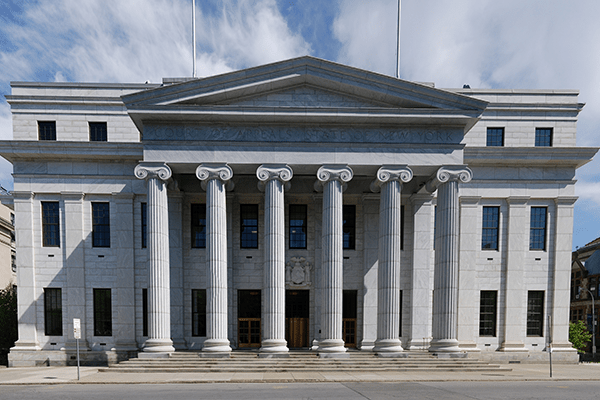|
RCBJ-Audible (Listen For Free)
|
Issue At Highest State Appellate Court Is Whether Or Not Failure To Hold A Public Referendum On Term Limits Was A Procedural Or Substantive Error
By Tina Traster
Not so fast – the Town of Clarkstown’s Netflix-worthy saga over term limits and ballot opportunities – is still not over.
The familiar cast of attorneys battling over Clarkstown’s term limits law Robert Spolzino, Lawrence Garvey (Republican County chair), Clarkstown’s Deputy Town Attorney Kevin Conway, and Intervenor Attorney Daniel Szalkiewicz on Tuesday argued before the New York State Court of Appeals in Albany after a stunning decision on Monday by the lower appeals court to reverse a Rockland County Supreme Court decision upholding term limits.
Szalkiewicz, representing Intervenors Councilmen Frank Borelli and Patrick Carroll, said he was surprised he was given the chance to go before the three-judge panel to present the appeal but even more floored when the panel elevated the case the same day to a full bench of seven Court of Appeals’ judges.
“I was already in in my car heading home from Albany when I got the call that the court had granted our motion for leave,” said Szalkiewicz. “This never happens. Everybody jokes that this never happens, but they called us back, they granted our motion for leave.” In other words, the Court wanted to hear argument on the appeal.
In a hearing that lasted less than 20 minutes, New York’s highest court turned its attention to a battle that has been consuming Clarkstown for six months, leaving voters confused as to who will be on the ballot, officials and candidates jockeying for position, and lawyers up to their ears in briefs and dates in court.
The New York Court of Appeals is expected to rule by the middle of next week, which keeps the topic front and center, and continues to make Clarkstown conversations feel like a constant game of horse racing.
Of course, this is not a game, and this final decision, one way or the other, will carry great weight as the court parses whether or not the term limits law was legally passed in the first place in 2014, and if it wasn’t, whether the omission to hold a mandatory public referendum is a procedural or substantive defect.
On Monday, an appellate panel in the Second Department overturned three lower court rulings that had upheld the Town of Clarkstown’s term limit law. The term limit law barred Hoehmann from running for Town Supervisor in November.
The decision entered late Monday evening stunned the community, which largely expected Justice Amy Puerto’s decisions upholding term limits to stick. The appellate decision essentially said that the failure to hold a mandatory referendum back in 2014 rendered the term limit law invalid.
Spolzino, representing Hoehmann, told the Court of Appeals on Tuesday that “laws don’t get enforced without being enacted.” He also said “If people don’t vote on it, it ain’t a law. People are entitled to vote. That’s the bottom line.”
Conway echoed that argument, saying the case has been about the “sanctity of the right to vote.”
The Second Department’s decision focused too on the failure to hold a referendum.
“Where a referendum is required, but is not held, the local law is invalid,” according to the ruling by the appellate panel. “Here, the intervenors do not dispute that the enactment of Chapter 263 was subject to a mandatory referendum.”
The majority opinion also said, “This case affects the rights of the future town board and the public and the sanctity of the right to vote.”
In 2014, the Clarkstown town council voted to adopt a term limit law, restricting elected officials to eight consecutive years in office. However, the appellate court said this law should have been subjected to a public referendum. Further, the panel said, “the inclusion of a provision requiring a supermajority to repeal the law curtails the power of elective officers.” Such a provision, binding the hands of future lawmakers and limiting their ability to repeal the law by a simple majority supported invalidating the law.”
In a dissenting opinion in the lower appellate court, Justice Cheryl Chambers argued for affirming Judge Puerto’s rulings, cautioning the Court not to confuse procedural errors in how a law is passed with the substantial or significant harm the law may cause later on. She also said that there was nothing about the supermajority that ran afoul of the law that required “at least” a majority of the council to pass a local law.
In court Tuesday, the New York Court of Appeals’ judges pondered whether the law was invalid or inoperative, and if so, was the error fatal to the law’s validity.
“That’s what we have to determine,” one judge said.
Szalkiewicz said the argument boils down to whether or not the highest court’s state relies on precedent, “and the precedent is that the failure to hold a referendum is a procedural defect.”
The attorney agrees that Clarkstown officials made a procedural error when they failed to hold a referendum. “They got bad advice.” But he added, “My only argument is that a procedural defect is subject to either a four-month or six-year Statute of Limitations,” which means the complaint is time-barred and Judge Puerto agreed with that.










